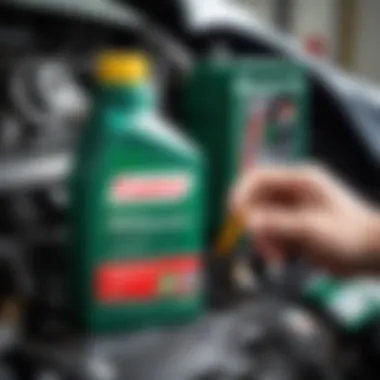Castrol vs ZIC Engine Oils: A Detailed Comparison


Intro
The selection of engine oil is a critical aspect of vehicle maintenance that significantly influences engine performance and lifespan. With countless brands on the market, discerning what sets apart different oils becomes essential for both automotive enthusiasts and professionals. Two prominent names in this sector are Castrol and ZIC. This analysis intends to explore their unique formulations, performance metrics, and user experiences, enabling informed choices catered to diverse automotive needs.
Both brands have built strong reputations. Castrol, with its long history and recognition in motorsport, prides itself on high-performance formulations. Meanwhile, ZIC offers an appealing price point, often marketed as a reliable alternative that does not compromise on quality. This exploration should help uncover the strengths and weaknesses of both, aiding users navigating this crucial decision in their vehicle care regime.
The upcoming sections will examine specific characteristics of both oils based on aspects such as formulation specifics, performance in different scenarios, and user feedback, thus providing an insightful comparison.
Prologue to Engine Oils
Engine oils are crucial for the proper functioning and longevity of vehicles. They provide lubrication, reduce friction, and help keep engines clean. In this section, we will examine the significance of engine oils and how they relate to the performance of different vehicles. Understanding engine oils is pivotal when considering options like Castrol and ZIC.
Quality engine oil ensures smooth operation, protects vital components, and enhances efficiency. It also influences fuel consumption and emissions, making it an essential aspect of vehicle maintenance. Knowing the types of engine oils helps consumers and technicians make informed choices when selecting a product. This foundation sets the stage for a deeper investigation into Castrol and ZIC in the subsequent sections.
The Role of Engine Oil in Vehicle Maintenance
Engine oil plays several key roles in vehicle maintenance. First, it lubricates engine parts to minimize wear. Without proper lubrication, parts would grind against each other, causing significant damage over time. Additionally, engine oil helps to remove dirt and sludge that accumulates within the engine. Regular oil changes keep the engine clean and functioning optimally.
Another important function is temperature regulation. Engine oil absorbs heat and helps maintain a stable operating temperature, preventing overheating. It also seals gaps between moving parts, which can reduce leaks and improve efficiency.
In summary, engine oil is vital to ensuring a vehicle runs smoothly. Regular maintenance, including oil changes, not only prolongs the life of the engine but also optimizes performance.
Understanding Different Oil Types
The variety of engine oils available today can be categorized into three main types: mineral oil, synthetic oil, and blended oil.
Mineral Oil
Mineral oil is derived from refining crude oil. It has been a traditional choice for engine lubrication. One of its key characteristics is its lower cost compared to synthetic options. This makes it a popular choice among budget-conscious consumers.
However, mineral oil may not perform as well under extreme conditions. Its thermal stability is lower, meaning it can break down faster at high temperatures. This can lead to increased engine wear in more demanding driving conditions.
Synthetic Oil
Synthetic oil is engineered rather than derived from crude oil. Its formulation provides various advantages. Synthetic oils offer enhanced thermal stability and better performance at extreme temperatures. This makes them suitable for high-performance engines or those subjected to harsh conditions.
They may come at a higher price point but often result in longer oil change intervals and improved fuel efficiency. Most key brands like Castrol and ZIC offer formulations that leverage the benefits of synthetic oils.
Blended Oil
Blended oils combine mineral oil with synthetic components. This gives them characteristics of both types. The key advantage of blended oil is its ability to provide a balance between cost and performance. Consumers benefit from some of the thermal stability found in synthetic oils while avoiding the full price of pure synthetics.
However, they may not offer the same level of performance as full synthetics in extreme conditions but provide a good middle ground for many users.
Understanding the differences among these oils informs better decision-making when selecting engine oil. Each type has unique qualities and serves diverse automotive needs.
Overview of Castrol Engine Oils
Understanding Castrol engine oils is crucial for a thorough comparative analysis against ZIC. This section will cover the historical significance, formulations, and performance characteristics. Knowing the background of a brand aids in comprehension of its products' reliability and consistency. Moreover, Castrol is often associated with innovation, making its evaluation essential for users seeking high-quality engine oils.
Brand History and Evolution
Castrol was established in the early 20th century, initially focused on producing oils for steam engines and later adapting its formulations for automobiles. Over the decades, it has evolved significantly, constantly adjusting to technological advancements in the automotive industry. The brand gained a reputation for quality and performance, underlined by a commitment to continuing research and development. This evolution has allowed Castrol to maintain its relevance in a highly competitive industry.
Popular Products and Formulations


Castrol EDGE
Castrol EDGE is designed for high-performance vehicles. It incorporates Fluid Titanium Technology, which enhances film strength and reduces breakdown under pressure. This feature is particularly beneficial for engines subjected to extreme conditions. Users have reported better acceleration and responsiveness when using EDGE, making it a top sought-after choice in performance circles. Its capacity to provide lasting lubrication under pressure is a definitive advantage, though some may find its price point higher than traditional oils.
Castrol GTX
Castrol GTX targets motorists looking for dependability and value. It has a reputation for exceptional engine cleanliness, formulated with additives that help combat sludge build-up. This characteristic makes it an attractive option for older engines that require more frequent oil changes. One downside is that it may not offer the same level of performance enhancements as synthetic oils, which could be a consideration for performance-minded drivers.
Castrol MAGNATEC
Castrol MAGNATEC is known for its unique molecules that cling to engine parts, providing additional protection during start-up. This feature stands out especially for those in regions with harsh weather conditions where cold starts are frequent. The overall protective qualities make it a popular choice for daily drivers. However, there are discussions about the long-term benefits of its technology versus traditional oils, leading to varied opinions among enthusiasts.
Performance Characteristics
When evaluating the performance characteristics of Castrol's offerings, one notes their commitment to stability under diverse operating conditions. The oils generally show excellent temperature resistance, ensuring that engines run smoothly, even under stress. Additionally, the brand's long-standing reputation is often echoed in customer feedback highlighting its effectiveness in maintaining engine health over time. Overall, Castrol's line-up provides a range of options benefiting both casual drivers and performance enthusiasts alike.
Overview of ZIC Engine Oils
Understanding ZIC engine oils is crucial in assessing the nuanced choices available in automotive lubrication. The brand presents a range of products that cater to diverse engine needs, offering options for everything from everyday vehicles to high-performance machines. In this section, we delve into ZIC's background, its range of core products, and the performance metrics that set it apart in the market.
Brand Background and Development
ZIC, produced by SK Lubricants, has established itself as a reputable player in the global engine oil market. Originating from South Korea, ZIC has been recognized for its commitment to quality and innovation. The brand emerged in response to the growing demand for high-performance lubricants in both domestic and international markets. Over the years, ZIC has dedicated itself to research and development, aligning with advancements in automotive technology. This constant evolution has ensured that ZIC remains relevant, appealing to an ever-expanding consumer base.
Core Products and Their Features
The variety of products offered by ZIC can be classified into several categories that cater to different types of vehicles and conditions.
ZIC X9
ZIC X9 is among the flagship offerings of the brand. This fully synthetic oil is tailored for high-performance engines, specifically designed to perform well under extreme conditions. One key characteristic of ZIC X9 is its enhanced thermal stability. This feature helps in maintaining optimal viscosity, which is vital for the effective operation of engines under high stress. The benefits of ZIC X9 are evident in its capability to extend oil change intervals while providing greater protection against wear and tear.
ZIC A
ZIC A oil is fundamentally focused on the needs of modern gasoline engines. It is known for its balanced formulation that prioritizes engine cleanliness and protection. A notable aspect of ZIC A is its compatibility with multiple engine types, making it a versatile option. The unique aspect of ZIC A lies in its additives that help in keeping engines free from deposits, ensuring longer engine life.
ZIC G
ZIC G is designed with a focus on delivering robust performance in both gasoline and diesel engines. Its key characteristic is its superior detergency, which effectively cleans and protects engine components from harmful deposits. The durability of ZIC G under various operating conditions makes it a popular choice among users seeking maximum protection without compromising on performance.
ZIC
ZIC M targets high-demand driving conditions, making it suitable for both passenger vehicles and light trucks. One of the standout features of ZIC M is its excellent cold-start performance. This can be especially advantageous in regions with harsh winters, where engine oil viscosity is a concern. The primary advantage of ZIC M is its ability to provide immediate protection from the moment the engine starts, helping to minimize wear during crucial startup phases.
Performance Metrics
Analyzing ZIC engine oils involves looking at key performance metrics such as wear protection, temperature stability, and deposit control. Overall, ZIC oils are designed to meet or exceed industry standards, offering reliable performance across various driving conditions. For users, this translates into confidence in their oil choice, knowing they are supporting their engine's health effectively.
In summary, ZIC's commitment to innovation, combined with a well-rounded product line, positions it as a competent competitor in the engine oil landscape. Understanding these aspects can assist consumers in making informed choices regarding their engine oil selections.
Comparative Analysis of Castrol and ZIC
A well-informed choice between these oils can lead to better engine protection, improved fuel efficiency, and reduced wear. There are key elements to explore, including the composition of the oils, their effectiveness in maintaining engine integrity, their response to temperature changes, and how often they need to be changed. Each of these factors can dramatically impact overall vehicle operation.
"The right engine oil is not just a choice; it is a commitment to the engine's health and performance."


Formula Differences
The formulations of Castrol and ZIC oils vary significantly, each tailored to specific automotive needs. Castrol uses advanced synthetic technology in products like Castrol EDGE, promoting high-performance capabilities. Its formulas often incorporate proprietary additives that enhance lubricating properties under various operating conditions.
ZIC, on the other hand, emphasizes a blend of synthetic and mineral oils, notably in ZIC X9. This blend helps achieve a cost-effective solution without sacrificing essential qualities. The balance of these ingredients targets stability, reducing engine friction and aiding cold starts, which can be critical in colder climates.
Performance in Engine Protection
Engine protection is a crucial aspect of engine oil. Castrol engine oils, particularly those with its unique formulation, are known for superior engine cleanliness and protection against wear. This results from its high shear stability and its capacity to resist breakdown under extreme conditions.
ZIC also offers commendable protection, especially in urban driving conditions where stop-and-go traffic puts additional stress on engines. However, some users have reported that ZIC might not perform as well under sustained high-temperature scenarios compared to Castrol. It is vital to consider operating environments when evaluating these products.
Temperature Stability
Temperature stability is another important consideration in this comparative analysis. Castrol oils are engineered to perform consistently across a wide temperature range. They maintain viscosity in high heat and protect against sludge formation during low-temperature starts.
ZIC has made significant strides in this area as well, particularly with its ZIC G series. These products are designed to handle higher temperatures, though anecdotal evidence suggests that they may not match the performance of some Castrol formulations in extremely high-temperature environments. For some users, this could affect long-lasting durability under strenuous driving.
Longevity and Oil Change Intervals
Oil longevity directly correlates to how often one must change the oil. Castrol's synthetic formulations often provide longer intervals between changes. Users report that with Castrol EDGE or MAGNATEC, it is common to drive up to 15,000 kilometers before needing a change, depending on driving conditions.
In contrast, ZIC oils, particularly the more standard offerings, may necessitate more frequent changes. Users often find themselves changing ZIC every 7,500 to 10,000 kilometers. A shorter interval can increase overall maintenance costs, so this is a significant consideration for those looking to optimize both budget and vehicle performance.
User Experiences and Feedback
Understanding user experiences and feedback is crucial when evaluating engine oils. These insights reveal how each product performs over time and under varying conditions. Real-world user reviews can provide valuable information that laboratory tests might not cover. Feedback from consumers highlights the pros and cons of using Castrol and ZIC oils, serving as practical guides for potential buyers.
When buying engine oil, factors like performance reliability, cost efficiency, and user satisfaction can significantly influence one’s choice. It is especially important for automotive enthusiasts, mechanics, and professionals who need to rely on the oil they choose for optimal vehicle performance and longevity. User experiences also help potential buyers to weigh their options in formulations, protection, and overall value.
Castrol User Reviews
Users of Castrol engine oils often praise its high performance in various driving conditions. Many customers point out that products like Castrol EDGE and Castrol GTX provide excellent engine protection, especially during intense usage or extreme temperatures.
Common themes in reviews include:
- Smooth operation: Users note reduced engine noise and smoother gear shifts.
- Reduced oil consumption: Many report that Castrol oils do not need frequent top-ups, a testament to their efficiency.
- Positive impact on fuel economy: Some reviews highlight better mileage after switching to Castrol products.
However, it is not without its criticisms. Some users have expressed concerns about the pricing of Castrol oils compared to other options, saying it may not always provide clear advantages for everyday driving.
Ultimately, the positive experiences create a strong recommendation for Castrol, especially for those who drive in demanding conditions.
ZIC User Feedback
ZIC engine oils have garnered a devoted following, especially in markets where it is well promoted. Feedback often cites the brands like ZIC X9 and ZIC A as favorites among users for their comprehensive protection and performance.
Key points from user feedback include:
- Good value for money: Users often highlight ZIC’s competitive pricing compared to brand rivals.
- Effective engine protection: Many reports indicate that ZIC oils perform well in wear protection, contributing to longer engine lifespan.
- User-friendly applications: Reviews mention how ZIC oils easily mix and work well across different engine types.
Yet there are also mentions of variability in performance, as some users report differences depending on the vehicle type. These insights can be beneficial for consumers considering ZIC for particular engines or driving conditions.
In the perspective of many users, choosing the right oil comes down to balancing cost with performance expectations.
Both Castrol and ZIC have their strengths and weaknesses according to user experiences. Engaging with real-world reviews allows prospective buyers to make informed choices that best suit their individual vehicle and driving preferences.


Cost Considerations
In the realm of engine oils, understanding cost considerations is vital for both consumers and professionals. The financial aspect of selecting between Castrol and ZIC engine oils can significantly influence decisions, especially when balancing performance, longevity, and vehicle requirements. Cost considerations are not merely about price tags; they encapsulate the overall value one gets from investing in a particular product. This section evaluates the price differences and the perceived value of both brands to ascertain which option may be more financially prudent in the long run.
Price Comparison
When evaluating Castrol and ZIC engine oils, the first step is to analyze their price points. Castrol oils often occupy a higher price range compared to ZIC, reflecting its extensive research, advanced technologies, and diverse product offerings. For example, Castrol EDGE typically retails at a premium due to its high-performance claims and synthetic formulation.
On the other side, ZIC products, while generally less expensive, offer competitive performance. ZIC X9 is one such product that appeals to budget-conscious consumers without sacrificing quality. The difference in pricing can be attributed to the brands' market strategies and production processes. Also, seasonal promotions and retailer discounts may influence the final purchase price.
A direct price comparison can be beneficial:
- Castrol EDGE: Generally in the range of $30-$50 for a 5 quart bottle.
- ZIC X9: Typically priced between $20-$35 for a similar quantity.
Value for Money Analysis
Value for money analysis goes beyond the current cost to consider long-term benefits and product performance. Value refers to what customers derive in relation to what they pay. Castrol's premium pricing is often justified by its claims of superior engine protection and increased fuel efficiency. Many consumers report that using Castrol results in fewer engine problems over time, potentially saving on future repairs.
Conversely, ZIC offers value through affordability without compromising necessary performance features. For drivers who regularly maintain their vehicles, choosing ZIC may prove advantageous due to lower upfront costs. As an example, drivers in warmer climates appreciate ZIC's thermal stability, reducing the need for frequent oil changes, thus enhancing its overall value.
In summary, making a decision based on cost requires careful consideration of specific needs, driving conditions, and budget constraints. Ultimately, the cost effectiveness of Castrol versus ZIC will depend on individual usage and preferences.
Environmental Impact of Engine Oils
Understanding the environmental implications of engine oils is crucial in today's automotive industry. The production and disposal of engine oils can have significant effects on both the ecosystem and public health. As automotive enthusiasts, mechanics, and industry professionals become more aware, their choices can drive positive change. This article assesses the environmental practices of both Castrol and ZIC, aiming to shed light on each company's commitment to sustainability and ecological responsibility.
Sustainability Practices of Castrol
Castrol has made notable strides in enhancing its sustainability profile. The company aims to minimize its environmental footprint across various stages of production and distribution. Some key practices include:
- Recycling and Reuse: Castrol has invested in technologies that facilitate the recycling of used oils. This process allows for the extraction and purification of elements, which can then be reused in new products. By adopting this circular approach, the company reduces waste and conserves resources.
- Carbon Footprint Reduction: Castrol actively works to lower its carbon emissions. This includes efforts to improve energy efficiency in manufacturing and exploring sustainable energy sources. The brand has set ambitious targets to reduce greenhouse gas emissions as part of its broader commitment to sustainability.
- Eco-Friendly Formulations: Many of Castrol’s products are designed with environmental considerations in mind. For example, their synthetic oils are formulated to deliver high performance while producing fewer harmful byproducts during use. These formulations help extend the life of engines, which in turn reduces the frequency of oil changes and waste.
The ongoing commitment of Castrol to these sustainability practices exemplifies a desire to align with contemporary environmental standards, making it a preferable option for eco-conscious consumers.
ZIC's Approach to Eco-Friendliness
ZIC has also recognized the importance of integrating eco-friendly practices within its operations. The company's approach focuses on innovative solutions that minimize environmental harm. Key initiatives include:
- Environmentally Responsible Manufacturing: ZIC has adopted cleaner production technologies. This change reduces the use of harmful chemicals and lowers toxic emissions during the manufacturing process. Furthermore, ZIC works to optimize its supply chain, ensuring that materials sourced are produced sustainably.
- Efficient Resource Management: ZIC promotes the efficient use of natural resources. This includes measures to conserve water and energy during various stages of manufacturing. By streamlining operations and reducing resource consumption, ZIC contributes to ecological sustainability.
- Product Innovation: ZIC continuously seeks to enhance its products with environmentally safe ingredients. The company formulates oils that provide high performance while minimizing environmental impact. The goal is to produce lubricants that not only safeguard engine integrity but also consider ecological implications during their lifecycle.
Final Recommendations
Understanding the final recommendations for selecting between Castrol and ZIC engine oils is crucial for making informed decisions. This section aims to provide guidance on key elements to consider when choosing engine oil. Selecting the right oil can significantly impact engine performance, longevity, and overall vehicle maintenance. By addressing specific criteria, the discussion will aid in narrowing down the options available.
Criteria for Selection
Vehicle Type
The vehicle type plays an important role in determining the appropriate engine oil. Different vehicles have distinct engine designs and requirements. For instance, performance cars may benefit from high-performance oils like Castrol EDGE, whereas standard sedans can utilize ZIC A. Understanding the specifications can contribute to efficiency and engine health.
A major characteristic of vehicle type is engine size and usage. Sports cars often demand oil that can withstand high temperatures and provide robust protection. In contrast, standard vehicles might prioritize fuel efficiency, requiring an oil that meets those criteria without excessive viscosity. Therefore, recognizing these aspects is pivotal for selecting the right engine oil, as it guarantees better compatibility with engine functions.
Driving Conditions
Driving conditions also influence engine oil selection. Factors like climate, terrain, and driving habits should be considered. In areas with extreme temperatures, the oil’s temperature stability becomes critical. For example, a driver in a cold region may prefer a synthetic oil that remains fluid at lower temperatures, such as Castrol GTX, for smooth operation.
Different conditions lead to different oil performance. Heavy traffic can cause oils to break down faster due to increased shear stress. Thus, choosing an oil able to maintain its performance in such conditions is essential. This characteristic enhances engine protection while prolonging oil life, yielding both performance benefits and cost savings in the long run.
Manufacturer Recommendations
Manufacturer recommendations are often based on extensive testing and can serve as a reliable guide when choosing engine oil. They specify the viscosity and oil type suitable for your vehicle’s engine. Following these guidelines ensures compatibility and optimal performance.
Many vehicle manufacturers detail specific oil grades and specifications, which provide insights into the oil's formulation. For instance, some engines may require low-SAPS oils designed to protect catalytic converters. Thus, adhering to these recommendations not only protects the engine but also promotes fuel efficiency and reduces emissions. This decisively affects the environmental impact and enhances the longevity of both the engine and the oil itself.







